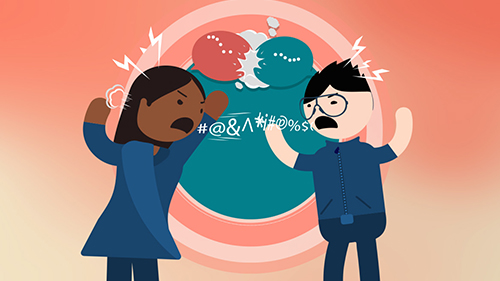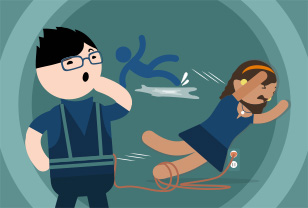If there’s one thing that causes anxiety in the professional world, it’s having awkward work conversations. But that doesn’t have to be the case.
Struggling with awkward work conversations? Watch our video, Personal Habits: Do’s & Don’ts!
From offices, restaurants, and gyms to construction sites, schools and more, workplaces are delicate ecosystems that can breakdown due to even the smallest of disturbances – like a speck of dust on a microchip.
Whether you need to speak with a coworker about their hygiene, ask your boss for a raise, or ask a colleague to stop eating their pungent lunch at their desk – these conversations are only going to become increasingly awkward the longer you put them off.
So, how do we avoid awkward work conversations?
The answer is simple: don’t.
“There is a danger in remaining silent. In the absence of conversation, people make assumptions. They may assume you don’t care or that you agree with a viewpoint that makes them feel marginalized. They may make assumptions about who you are or that you aren’t acting with positive intent.” – Bill Boulding, Duke University’s Fuqua School of Business
Many people choose to put off awkward work conversations because they are concerned about how it’s going to damage their working life. However, if one of your colleagues is behaving in a way that makes you uncomfortable, your working life is already being damaged, and you need to address the issue.
This doesn’t mean you should simply run around the office airing your grievances with every colleague who comes your way.
Discussions around personal behaviour should be conducted in a private area in a gentle and sympathetic manner. Be aware that the person undertaking the behaviour probably doesn’t even realise they are affecting others and may initially react defensively or in an offended manner.
A key thing to keep in mind is that people often won’t realise their behaviour is having a negative impact on their coworkers. A delicious, fragrant fish curry is all well and good when you’re the one eating it at your desk, but it’s also potentially nauseating for those around you.
If you want the quality of your working life to improve, you must be willing to have polite, respectful conversations with your colleagues when their behaviour is having a negative impact on you and your coworkers.

Keep personal grooming at home or in the bathroom.
Why Do We Avoid Awkward Work Conversations?
People avoid awkward work conversations for a variety of reasons, including:
- Fear that the conversation will only make things worse
- To protect the feelings of our coworkers
- Don’t want to start any controversy at work
- Avoid resentment
- Fear retaliation
If you’re avoiding a conversation for any of the above reasons, ask yourself this: would you want someone to speak with you if your workplace behaviour was inappropriate?
Don’t Bottle It Up
What happens when you overinflate a balloon? It explodes.
“Dodging issues, appeasing difficult people, and mishandling tough encounters all carry a high price for managers and companies — in the form of damaged relationships, ruined careers, and intensified problems.” – Holly Weeks, author of Failure to Communicate
Not having awkward work conversations with a co-worker who is behaving inappropriately is not only unhealthy on a personal level, it’s unhealthy on a collective level.
What do you think most people do when they’re too anxious to bring up an issue with the person they have said issue with? They complain about them to their co-workers, building more and more resentment as they go.
Think of it like asking someone on a date: it may not go well, but you’ll never know if you don’t have the conversation.

If you must take a personal call, be aware of your volume.
How to Say It
Before you storm into your colleague’s office or cubicle, remember the following:
- Be calm
- Be positive
- Be prepared but not robotic
- Be open
- Be understanding
- Be empathetic
- Most importantly, be professional
“Don’t go into a difficult conversation with a my-way-or-the-highway attitude,” says Rebecca Knight, a lecturer at Wesleyan University. If you’re unable to see things from your colleague’s perspective, how can you expect them to see things from yours? After all, they may have a good explanation for their behaviour.
Remember: it’s a conversation, not an attack. If you’re aggressive, rude or belittling, the next conversation you might be having could be with HR.
Keep It Professional and Positive
There’s no perfect solution or golden rule for having these awkward work conversations. You can, however, do your best to be kind, respectful, patient, professional and understanding.
Just because the conversation you’re about to have is potentially awkward, it doesn’t mean it has to be negative. These types of conversations should always be tackled with the aim of achieving positive results. In fact, if you’re feeling negative about an upcoming conversation, try taking some time to search for positives and put yourself in the right frame of mind. If you enter a conversation with a negative attitude, chances are it’s going to be a negative conversation.
The more constructive you can be, the better.

Avoid eating smelly foods at your desk.
What’s Next?
Congratulations on finally having that awkward work conversation, but what’s next?
While you may think your job is done, it’s crucial to remember that awkward conversations don’t simply disappear once finished; they will often stay on your mind, as you replay them repeatedly in your head — what could you have said differently? Why didn’t you do it sooner? Did I upset anyone?
It’s important that you don’t dwell too much on the conversation, and it’s perfectly fine to acknowledge that it was a stressful experience.
If the conversation didn’t go perfectly, that’s fine. Everybody makes mistakes, and people aren’t perfect; if they were, you would have never needed to have that awkward work conversation in the first place. If need be, re-discussing the issue may help ease your mind.
“There is huge value in appreciating that you were able to come together, identify and discuss a big issue, and even have the conversation in the first place. Thank your colleague for taking the time to engage in the conversation.” – Dolores Bernado, Harvard Business Review











